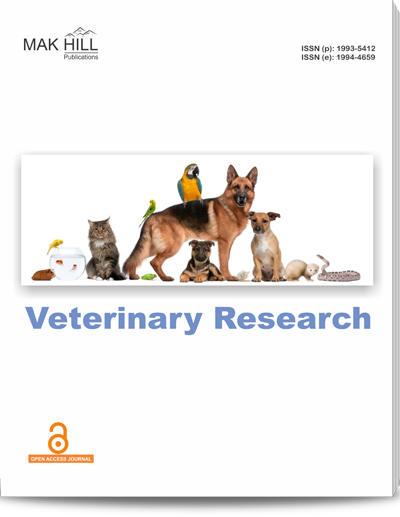
Veterinary Research
ISSN: Online 1994-4659ISSN: Print 1993-5412
Abstract
A study was conducted to evaluate the effects of ground fenugreek seeds given to laying hens at 0 (FS0), 0.5 (FS0.5), 1 (FS1) or 2 (FS2) g/hen/d on laying performance, egg quality characteristics, serum and egg yolk cholesterol concentrations. An experiment was performed as completely randomized layout with four treatments and four replications. One hundred and ninety-two, 49-week-old, (bovans strain) laying hens (48 hens per treatment) were fed for 12 weeks 100 g days–1 of a basal diet in addition to the specified ground fenugreek seeds amounts. While FS2 showed highest body weight loss at the end ofthe experiment (112.6 for FS2 vs. 29.7, 27.5and 99.10 g/hen for FS0, FS0.5 and FS1, respectively) there were no differences amongtreatment groups for daily feed intake (98.2, 101.4, 102.4 and 103.1 g/hen for FS0, FS0.5, FS1 and FS2, respectively), hen-day layingrate (81.17% for FS0 to 78.60% for SF2), eggweight (82.04 g for FS1 to 79.82 g for FS0.5), eggmass (49.13 g/hen/d for FS2 to 51.21 g/hen/dfor FS0), feed efficiency (feed intake/eggmass, 1.95 for FS0 to 2.19 for FS2) and egg quality characteristics. Shell weight variedfrom 8.20 g for FS0 to 8.46 g for FS1. Shell thickness varied from 0.97 mm for FS2 to 0.99mm for FS0.5. Yolk weight ranged from 16.8 gfor FS2 to 16.74 G for FS0. Albumen weight ranged from 37.28 g for FS1 to 38.90 g for FS0.5. Inclusion of ground fenugreek seeds reduced blood serum cholesterol from 104.3-84.7, 93.7 and 87.2 mg dL–1 for FS0.5, FS1 and FS2, respectively. It did not affect egg yolk cholesterol (21.75 mg g–1 for FS2 to 22.88 mg g–1 for FS0). It can be concluded that groundfenugreek seeds given to bovanslaying hens at up to 2 g/hen/d had no effect onfeed intake, laying production performance andegg quality but reduced hen’s serum.
How to cite this article:
Seyed Mohammad Motamedi. Egg Quality Characteristics, Serum and Egg Yolkcholesterolin Laying Hens.
DOI: https://doi.org/10.36478/vr.2014.40.45
URL: https://www.makhillpublications.co/view-article/1993-5412/vr.2014.40.45